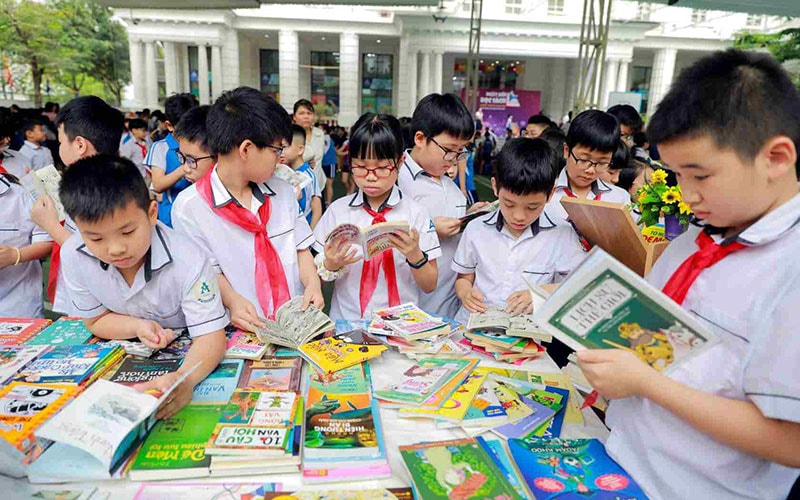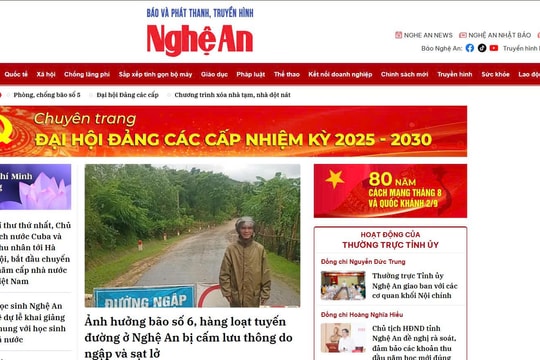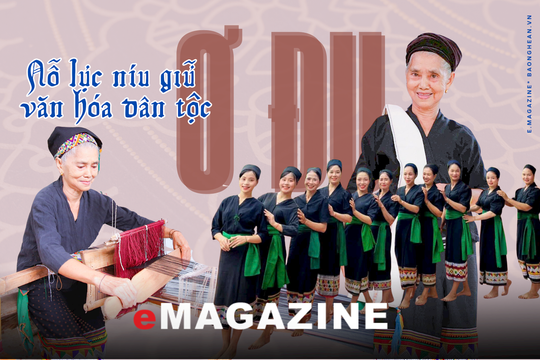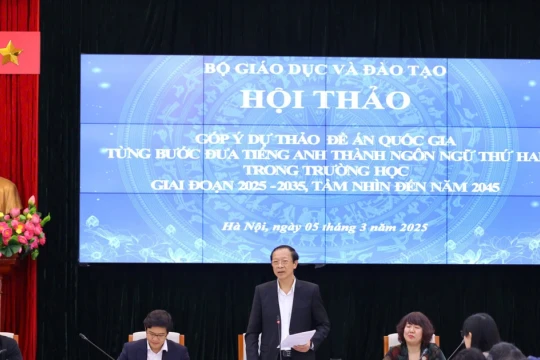Tackling online language abuse
The emergence of the Internet has created a major turning point in the history of human civilization. And from here, the Internet has brought about a number of changes in the lives of many communities, in the styles, habits, interests,... of many people.
Regarding language, in addition to positive factors and timely access to the development of science and technology, there has been a habit of using "internet language" with many limitations that can have a negative impact on young people, so it needs to be addressed and adjusted accordingly.
"Internet language" is a concept often used to refer to the way of speaking/writing used in the online environment, mainly unofficial addresses such as social networks Facebook, YouTube, Twitter, TikTok, Instagram, ... to many other communication channels such as Zalo, Viber, WhatsApp, and often expressed through livestream, comment, chat... Called unofficial but their influence in the daily life of each community is extremely large. Therefore, in the face of the situation where the habit of expressing language through the above channels of a large number of users has a certain difference compared to the language used as a standard for communication, teaching, learning, and included in books, many parents cannot help but worry that those unofficial language expressions will negatively affect their children's acquisition of standard language.
 |
| Students of Achimedes Primary School are excited about the 2021 Reading Festival. (Photo taken before the 4th Covid-19 outbreak) |
Observing social networking sites, it is easy to see many manifestations of Vietnamese deviation in speaking and writing, from the distortion of word shells or intentional misspelling, for example: "sad" is written as "mu", "always" as "lun", then written as "roi", "nhe" as "nho", "nha" as "na", "xinh" as "xuynh/xynh", "min" as "menh", "yeu" as "iu", "the" as "that",... "lam sao" as "nam thao", "nha" as "du nay", then as "doi", "so" as "xo", "co giao" as "ko zao", "gia gia" as "za ca", "trai dep" as "trai dep", "dep trai" as "dat chai"... Some young people even create abbreviations from simple to complex such as: "chong" as "ck", "voi" as "vk", "truong" as "truc", "duoc" as "dua", "voi" as "vk", "ha ha" as "kk"... To avoid parental control, many young people also agree with each other to create a way of writing that only two people or people in a group can understand. The new metaphors that many people like to use at first glance look like idioms and proverbs, but in fact they are all new units created and used by young people as their daily language: Sad as a dragonfly, high as a pangolin, evil as a rhinoceros, bored as a cockroach, tiger in kindergarten, playboy not afraid of rain... Most of these linguistic units are only linked in terms of rhyme for fun but have no semantic connection like traditional, exemplary idioms and proverbs.
Along with the distortion and deformation of Vietnamese, the phenomenon of inserting English into daily conversations or on communication channels of young people is becoming more and more dense, English words are used with high frequency. In many cases, this creates obstacles when older people want to communicate or want to read information from young people. Many word units have now become the mouthpiece of young people such as: check in, bill, deadline, online, off, live, show, sale, menu, team formation... Then there are abbreviations and abbreviations with English such as BWF, one for night (149)... Not only that, the insertion of English is also abused in many songs composed by young people and has been distributed/published quite freely on the internet, sometimes beyond the control of authorities. Typically, some singers with a large number of fans often compose and perform songs with lyrics inserted with English sentences and words. There are young songwriters who are so "foreign-minded" that they not only insert English into lyrics like "Why it's me. What should I do? In front of me is... Tell me... When all the love behind my back is just a lie. I can't suffer unpredictable things you did to me" (song: Don't need anyone else) but also use a "Western" stage name like Mr. Siro ft. BigDaddy!
The widespread and increasing trend of deviant Vietnamese speaking and writing in recent times has caused pain, disgust, and concern for many people, especially those who care about preserving national cultural values, including language. In fact, it is not only today that we have to speak up about issues related to the Vietnamese language. As early as 1966, Prime Minister Pham Van Dong launched the movement to Preserve the Purity of the Vietnamese Language. At that time, a solemn conference was held, gathering the participation of many famous intellectuals with hundreds of reports and discussions revolving around the issue of how to speak and write Vietnamese better, more correctly, accurately, and more attractively. That also means that the Vietnamese language needs to achieve standardization in the mass media, in legal documents, and in works published and printed in Vietnam.
When the internet has become an indispensable element in modern life, we are forced to accept a new operating environment for Vietnamese, which is the network environment and the birth of "internet language". Basically, Vietnamese expressed through "internet language" is still within the general mechanism of the rules that have been recognized by the community regarding vocabulary, phonetics, and grammar. However, the excessiveness of a part of internet users, especially young people, makes many people worry about Vietnamese losing its standard beauty and natural purity. Moreover, when children are exposed to the internet at an earlier age, the influence of such deviant ways of speaking and writing on innocent, pure souls is quite obvious, and everyone can feel it. Many parents are startled to see that their children, who are only in first and second grade, have quickly memorized broken rap verses with quite vulgar and vulgar content, which are being condemned by many people, such as: "Don't yell/lick me, I'll leave the red/world for you, Never/ever hold my child...". In the context of the Covid-19 pandemic that has had a severe impact over the past time, many schools have had to close, students have had to study online, internet access is inevitable, so exposure to non-standard ways of speaking and writing is spreading at a dizzying speed. So how can we solve the above situation?
When the epidemic is still as complicated as it is now, many children in the city, outside of school hours, are at risk of immersing themselves in video games, cartoons, or some social networking sites. They lack orientation in reading to expand their language skills, and are limited in movement and interaction with the outside environment, unfamiliar with the beauty of the natural world. Therefore, the coordination of education between family and school must be carried out in a close and specific manner. Only when bringing children the true beauty of life and language, will deviations be gradually pushed back. Literature teachers in general schools, in addition to the works required to be studied in the program, should introduce to students works that need to be read, suitable for each age group. By encouraging children to access appropriate literary works, through the beauty of musical language, through proverbs, folk songs, especially through daily communication between parents and the elderly, we can help them feel and receive the beauty in the language of their ancestors.
In addition, abbreviations, abbreviations, and intentional misspellings are almost only allowed to exist online, because when doing homework in class, students still have to write according to the standards they have received from the formal educational environment. We also need to calmly recognize that, after all, the use of Vietnamese by young people with many deviations from the standards is only a very small slice in the endless flow of Vietnamese. Vietnamese cannot easily change its eternal appearance because of a few individuals or a group of people. Only the good, the beautiful, the reasonable and the convenient are the things that have the opportunity to stay long-term and sustainably with the community. However, to reduce the negative impacts on language usage habits, contributing to the best orientation for our children's generations when speaking and writing Vietnamese, in addition to the cooperation of the whole society, it is necessary to have the active participation of scientists, teachers, relevant agencies, and responsible units in protecting and building cultural values and standards for the community.
In fact, the use of language online has been and is being controlled quite effectively by managers and operators. Any statements and images that do not meet standards are reminded, and even the owners of bad statements and images must be punished at different levels. This is necessary and needs to be further promoted to contribute to preserving the purity of the Vietnamese language. In addition, influential individuals in the online community, especially celebrities, need to raise their responsibility and awareness in using their daily language on personal pages, thereby supporting and bringing positive impacts to society in general, and to the development of children in particular. And the efforts of each person will create motivation for the whole society to love the Vietnamese language more as a natural, humane feeling, forever in the hearts of every Vietnamese person./.





.jpg)

